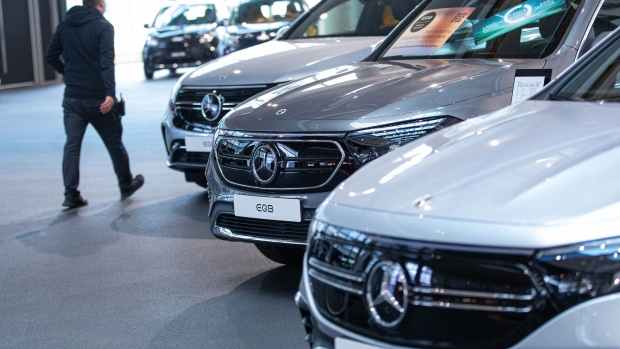Oct 26, 2022
Mercedes Hikes Profit Goal With Demand Outstripping Supply
, Bloomberg News

(Bloomberg) -- Mercedes-Benz AG expects strong sales of top-end vehicles like its G-Wagon SUV to help shield the automaker from the global economy taking a turn for the worse.
While signs of a slowdown proliferate with surging inflation and rising interest rates, a shift to high-margin vehicles will keep returns from slipping below targets, Mercedes said Wednesday, reporting a jump in earnings and raising projections for the year. The company also kept intact its forecast for deliveries, even as it cut back its sales outlook for Europe and the US.
“Even if the macroeconomic situation in Europe is shaky in 2023, the appetite for these great products is there,” Mercedes Chief Financial Officer Harald Wilhelm said on a media call. After two years of protracted supply-chain shortages, a large backlog of orders will also support demand for vehicles in a downturn, he added.
Mercedes shares were almost flat at 11:42 a.m. in Frankfurt, after declining 14% so far this year.
Warnings over the health of the Chinese, European and U.S. economies are mounting as consumers face surging energy bills and slowing property markets. Automakers usually aren’t immune to downturns, though Mercedes has pledged to keep margins from slipping below 8% even in a very challenging environment by focusing on its biggest-earnings cars like the S-Class and its electric sibling, the EQS.
Returns in the core automaking division rose to 14.5% during the third quarter, up from 8.8% last year.
Raised Outlook
Robust sales especially for high-end models and healthy pricing prompted Mercedes to raise its outlook for the second consecutive quarter, defying the increasing drag from macro-economic factors. At the same time, executives stopped short of outlining expectations into next year. Tiremaker Michelin late Tuesday postponed a planned investor update for next month to March or April, saying it wasn’t possible to make any forecasts as cost inflation rips through supply chains and raw material sourcing.
Mercedes now sees group profit significantly higher than a year ago, up from a projection of a “slight” gain. For the core car division, the adjusted return on sales is expected to rise to as much as 15%, up from as much as 14%. Mercedes also raised the outlook for its vans division.
While Mercedes raised its guidance, record inflation and surging interest rates are hitting its business in the US and Europe, where the company downgraded sales expectations. The carmaker now sees deliveries in the US “significantly” lower than the prior year, compared with a slight decrease previously. In Europe, sales will decline further from an already-low level, a downgrade from an unchanged forecast.
Weaker US and European markets are expected to be offset by significantly higher sales in China, where tax breaks for car purchases are set to boost demand after a series of stringent pandemic lockdowns. Overall, Mercedes stuck to a projection for a slight rise in global deliveries for the year.
Russia Exit
Separately, Mercedes will exit its Russian business in the wake of the country’s invasion of Ukraine, planning to sell its subsidiaries to a local investor, subject to approvals from authorities.
Before the war, the automaker operated a so-called knock-down kit manufacturing plant near Moscow. The Russia plant, opened in 2019, received components for final assembly of E-Class sedans and other vehicles.
©2022 Bloomberg L.P.


